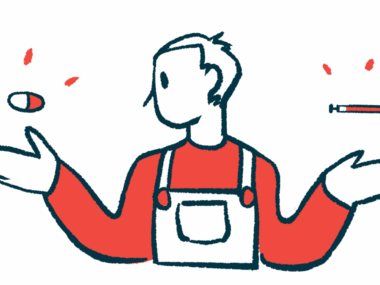For Rare Disease Day, I’m using my voice to advocate on the Hill
A columnist finds her calling in advocating for more research in rare diseases
Written by |

When I was growing up, I was the girl in class who frequently received teacher comments on my report card saying “talks too much in class.” While I agree that I probably should have paid more attention to the subject matter (especially math) instead of socializing with friends, it’s no surprise that my calling in life was to use my voice.
As my excitement builds for Rare Disease Week 2024, the last week in February, I’ve reflected a lot on those comments. I’m proud to have learned over the years not only to find my voice, but also to use it to advocate for others, including my daughter Bella, who in 2017 was diagnosed with the rare illness neuromyelitis optica spectrum disorder (NMOSD).
Efforts are currently underway around the world to commemorate Rare Disease Day on Feb. 29, which is special this year because it’s a leap day. This year, I’ve been selected for the second time to attend the EveryLife Foundation’s Rare Disease Week on Capitol Hill in Washington, D.C., along with other rare disease advocates, researchers, clinicians, and organizations that support those affected by thousands of rare diseases.
Mile-high advocacy
I was selected to be a team coordinator for meetings with U.S. representatives Brittany Pettersen and Ken Buck, both of Colorado. In that role, I’ll be tasked with leading meetings on the Hill, along with six other constituents from Colorado. The goal of the meetings is to advocate for more research, funding, and support for bills that are working their way through Congress in support of rare disease patients.
EveryLife Foundation’s Rare Disease Legislative Advocates will attend events Feb. 25-28. The National Institutes of Health (NIH) will host a special Rare Disease Day on the rarest day of the year, Feb. 29. While most meetings will be held in person, the Rare Disease Day event at the NIH will be held virtually.
The agenda for Rare Disease Week 2024 also includes legislative conferences, meetings with members of Congress, a rare disease congressional caucus, and a rare artist reception on Capitol Hill, to name a few.
Being selected to represent my beautiful state of Colorado and being a part of conversations to support rare illnesses is something I never dreamed I’d have the opportunity to accomplish. Being labeled the girl who “talks too much in class” has allowed me to use my voice to connect, advocate, and support others, which I believe is my calling in life.
Having a rare illness or caring for someone with one can leave you feeling lost in a world of unknowns. When Bella was diagnosed, she was so sick we didn’t know if she would survive, and if she did, we had no idea what life would look like afterward. This is where my journey of research and advocacy began.
Over the years, I have learned a lot, but there is still much more to do. I feel lucky to have a seat at the table where bills are passed, laws are made, and most importantly, where our voices are heard. I made a promise to Bella when she was diagnosed that her fight would be my fight, and that I would do anything I could to ensure that she was healthy, strong, educated, and supported in her dreams, no matter what they are.
What are your plans for celebrating Rare Disease Day? Please share in the comments below.
Note: Neuromyelitis News is strictly a news and information website about the disease. It does not provide medical advice, diagnosis, or treatment. This content is not intended to be a substitute for professional medical advice, diagnosis, or treatment. Always seek the advice of your physician or other qualified health providers with any questions you may have regarding a medical condition. Never disregard professional medical advice or delay in seeking it because of something you have read on this website. The opinions expressed in this column are not those of Neuromyelitis News or its parent company, Bionews, and are intended to spark discussion about issues pertaining to neuromyelitis optica spectrum disorder (NMOSD).







Leave a comment
Fill in the required fields to post. Your email address will not be published.